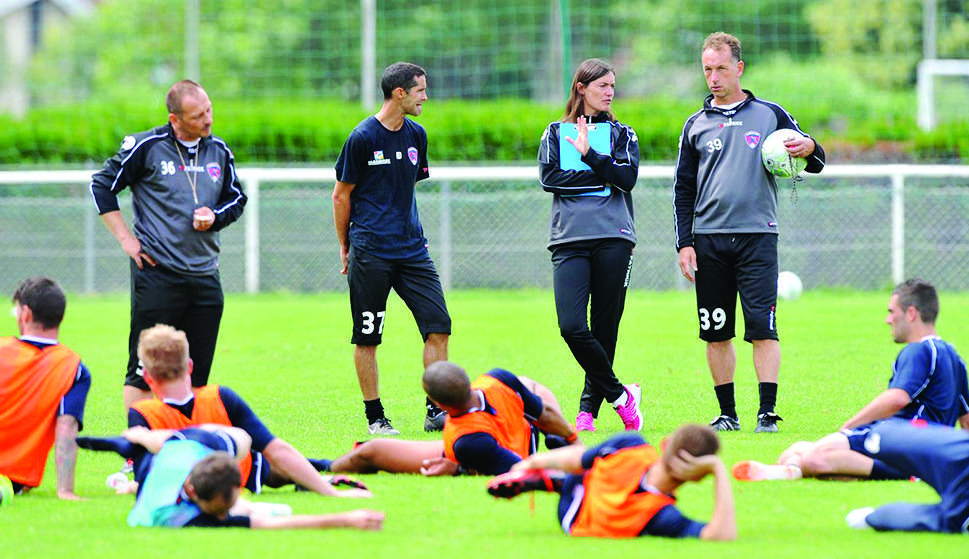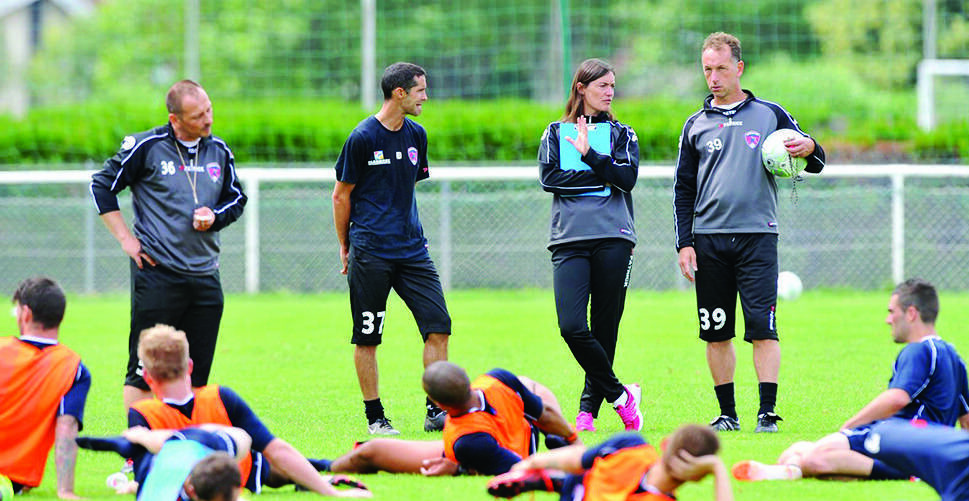
By Neil Cotton
In Clermont-Ferrand, capital of the mountainous Auvergne region of France, football has always been a poor second to rugby.
Whilst the town’s rugby side boasts an illustrious history, more latterly becoming French Champions in 2010 and European Champions Cup (Formerly Heineken Cup) runners-up in 2013 and 2015, its football team, Clermont Foot, can only offer up a third tier championship won in 2007 and which gave the club the membership of Ligue 2, French football’s second tier.
It was, therefore, quite possibly the first time that football had upstaged rugby in the town when Clermont Foot appointed Helena Costa as first-team head coach in May 2014, and, in doing so, grabbed the attention of the world’s media keen to hail a historic moment.
The appointment of the Portuguese had indeed been ground-breaking; She became the first ever woman to be appointed as head coach of a men’s team in the top two divisions of any professional European league.
Instrumental in the move had been the agent Sonia Souid – also involved in the first ever remunerated transfer of a French professional women’s player between two French clubs – who viewed the appointment as an opportunity to create real change in the world of football.
Although there were some who claimed that the appointment had been a publicity stunt on the part of the club’s president, Claude Michy – no stranger to such things – it was clear that Costa boasted a not unimpressive set of coaching credentials.
These included a Masters degree in sports science and a UEFA coaching licence. Costa had also worked as a scout for Celtic and coached Benfica’s male youth teams as well as the women’s national teams of Qatar and Iran. The 37-year-old’s CV also included a stint of work experience under compatriot Jose Mourinho at Chelsea.
To those hoping for change, however, there came a major blow when Costa quit barely a month into the job claiming that she had been effectively sidelined, being, she said, little more than a “face” to attract publicity.
Among Costa’s complaints were the arranging of pre-season friendlies and players being signed without her knowledge as well as a series of emails to the club’s technical director going unanswered.
A press conference in the wake of the departure only added to the impression that Costa’s appointment had been a false dawn for gender equality when Michy made a number of unenlightened-sounding remarks: “She’s a woman,” he said. “They are capable of leading us to believe in certain things and then… She simply said, ‘I’m going’.”
This, though, was not the end of the story. Michy wasted no time in appointing another woman as head coach. This time it was Corinne Diacre, a 39-year-old former French international defender with 121 caps to her name.
Captaining the side, she had also had a period as the national team’s assistant manager and had managed Soyaux, her old club, between 2007 and 2013.
As with Costa, Diacre’s appointment caught the attention of the world’s media with much of the coverage focusing on her gender.
Not all of this was welcome and, according to Michy, some reporters were even asking questions such as at what time did she enter the dressing room.
For Diacre, the continuing focus by elements of the press on her gender, rather than on her actions as a coach, has proved something of an irritant.
Over a year into the job, the now 41-year-old has, though, established a track record with which her work can be judged objectively.
In her first season, the club finished in 12th, an improvement of two places on the previous season, but, so far, her second season is proving to be something of a revelation with Clermont remaining firmly in the race for promotion to French football’s top tier, Ligue 1 – no mean feat for a club which has a notably small budget.
Diacre’s achievements received recognition with an extended contract in September of last year, committing her to the club until 2018 whilst at the end of the year the influential weekly publication France Football named Diacre as their top Ligue 2 manager of 2015.
Referring to the club’s unexpected surge towards the top table of French football, Diacre told the magazine that promotion would not just be a personal triumph, it would, she said, be a just reward for club president, Michy, who she credits with taking a risk on her appointment and continuing to provide her with his backing.
It is, though, a small irony that much of the worldwide attention on Diacre and Clermont Foot has evaporated and once again, in the Auvergne, it is rugby which receives the higher profile.
Diacre’s moment of triumph is therefore unlikely to be as widely reported as her appointment, but this is an achievement in itself as Diacre is unlikely to want any more than to be seen as just another coach of a


















